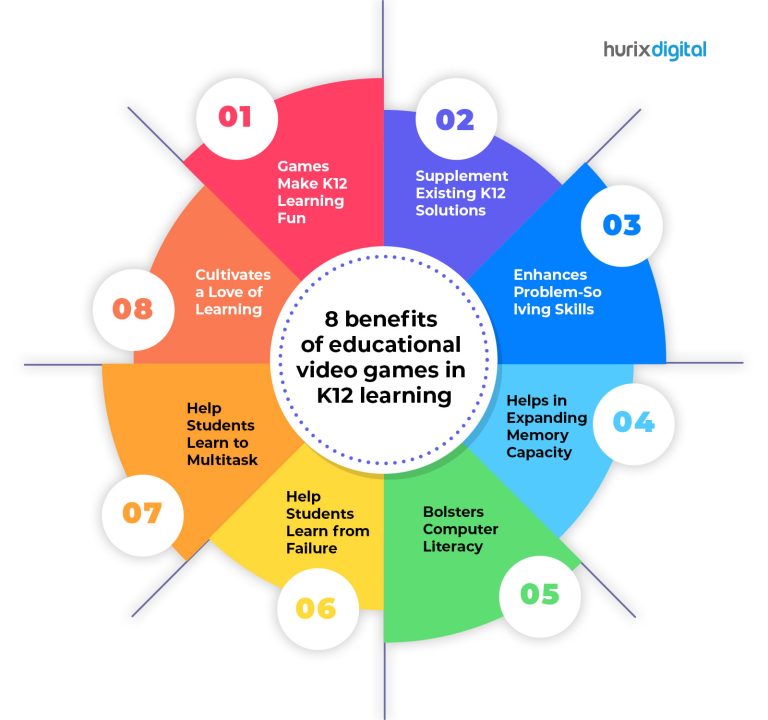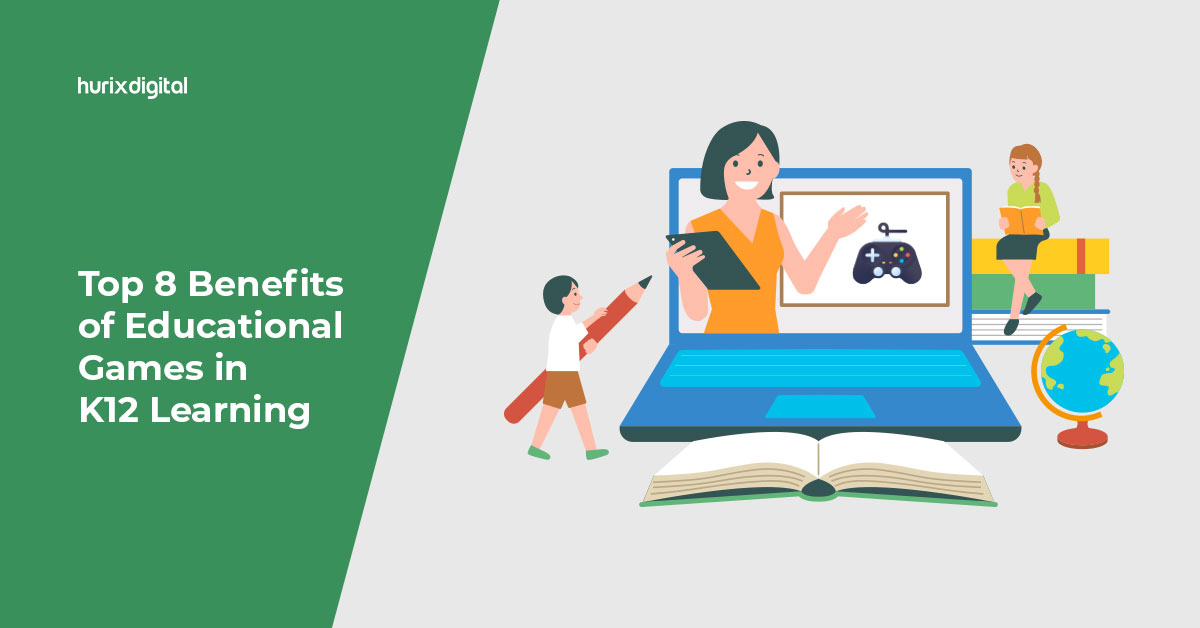Top 8 Benefits of Educational Games in K12 Learning
The value of games in K12 learning cannot be underscored. Fortunately, educators, parents, and guardians have more options available today than ever. Indeed, the top K12 education companies are providing K12 learning solutions that enhance and supplement in-class instruction on subjects ranging from Math to History. But how exactly does game-based learning help students?
Table of Contents:
- Top 8 Benefits of Educational Video Games in K12 Learning
1. Games Make K12 Learning Fun
2. Educational Video Games Supplement Existing K12 Solutions
3. Enhances Problem-Solving & Strategic Thinking Skills
4. Educational Games for Students Online Expand Memory Capacity
5. Bolsters Computer Literacy
6. Help Students Learn from Failure
7. Top K12 Education Companies Offer Video Games That Help Students Learn to Multitask
8. Games as a Component of K12 Learning Can Cultivate a Love of Learning - Learn More About K12 Learning Solutions from Game Learning and Hurix
Top 8 Benefits of Educational Video Games in K12 Learning

1. Games Make K12 Learning Fun
Multiple studies have shown that students learn complex information best when they are enjoying themselves. In other words, when learning is fun, students are more likely to engage in the material. This may be partly traced to the fact that for many students, playing a game improves mood. The brain becomes more flexible when in a good mood, allowing students to grasp more complex concepts.
2. Educational Video Games Supplement Existing K12 Solutions
If the COVID-19 pandemic taught us anything about education, it is that students need classroom instruction or they risk falling behind. However, educational video games are not designed to replace traditional classroom instruction. Rather, educational games for students online are merely meant to supplement traditional, proven K12 solutions.
Consider game-based learning solutions as the perfect accompaniment to textbook assignments. This may be especially true for young learners. For example, upon completion of maths problems in a textbook, young learners can reinforce what they have learned by playing an engaging maths video game. In doing so, educators can confirm that their students have retained the information from the book and that knowledge is now transferable to a game, and ultimately transferrable to life beyond K12 learning environments.
3. Game-Based eLearning Enhances Problem-Solving & Strategic Thinking Skills
Game-based e-learning affords experiential learning, helping students to develop problem-solving and strategic thinking skills. These creative problem-solving skills help the student not only thrive in academia but prepare them for life beyond the classroom. This unique feature is not by accident. The top K12 education companies recognize the value of games in education should not be limited to K12 learning. The games should have long-term, real-world usefulness.
Consider, for example, a history game designed by one of the leading K12 ed-tech companies. In the game, student players are tasked with settling a new colony. What will they need to survive? Will they partner with others, or attempt to build a colony alone? What tasks will they need to prioritize? Should they plant crops, or is it more beneficial to hunt or to fish? Learning to think strategically and critically is a key benefit of game-based e-learning.
4. Educational Games for Students Online Expand Memory Capacity
Educational games for students online require students to memorize facts, figures, locations, events, equations, formulas, shapes, categories, and much more. The top K12 education companies offer game-based learning solutions customized for each age. Young students may begin strengthening their memory by matching shapes, sizes, and colors. Older students may be tasked with recalling instructions or information presented earlier in a game to advance to the next level.
Indeed memory is bolstered through games. One study published in the journal Behavioral Brain Research found that “In a learning test, people who play video games performed better than those who don’t, and their brains appeared to be more active in regions linked to learning and memory.”
5. Game-Based Learning in Education Bolsters Computer Literacy
Students who are not computer literate will struggle not only in school but in life after school. For this reason, well-rounded K12 learning curricula prioritize computer literacy. Game-based e-learning unequivocally helps bolster computer literacy, as students must know how to type, employ keyboard skills and shortcuts, begin a new game, advance to the next level, or replay a game.
Also Read: Gamification: 5 Effective Ways to Gamify Learning in Higher Education
6. Game-Based Learning Solutions Help Students Learn from Failure
The lessons learned by failing are often underreported. However, learning to try again, instead of giving up after a failure is a key value of games in education. After all, learning to accept their own mistakes, and learn from them is an invaluable tool that will benefit students long after the completion of their formal K12 learning experience.
Prominent video game theorists have also postured that losing in a game is one of the reasons that students stay so engaged with game-based e-learning. The perceived “threat” of failing in a game may keep students riveted, while the opportunity to immediately “redeem” themselves by succeeding in their second or third attempt allows them to learn from mistakes.
7. Top K12 Education Companies Offer Video Games That Help Students Learn to Multitask
Whether a student is trying to solve various math problems in a timed session, or trying to organize objects by color and shape, game-based learning requires students to multitask. Learning to process more than one project at a time will benefit students by training the brain to work more efficiently. In other words, the act of multitasking paves the way for increased productivity and creativity in both K12 learning and life after formal education.
According to a report, “the encouragement of multitasking and quick decision-making has helped students think creatively and better address unexpected events. Video games have also been shown to boost multitasking and learning ability by stimulating the brain’s frontal lobe.”
8. Games as a Component of K12 Learning Can Cultivate a Love of Learning
Many studies have found that game-based learning in education shows numerous positive correlations between playing games and enjoying learning. The reason? Students find games both stimulating and motivating.
Developing a love of learning early in life offers long-term benefits including a desire to acquire new skills or knowledge, and an eagerness to build on existing knowledge. Moreover, research suggests that those who love learning also benefit from feeling a sense of autonomy, excitement about possibility, and positive feelings about learning new things.
Learn More About K12 Learning Solutions from Game Learning and Hurix
Game Learning creates award-winning, educational games for students online. Game-based learning solutions for Maths, Science, History, and ELT are available for Preschool, Primary, and Secondary age students.
As one of the leading K12 Ed-tech companies, Game Learning has partnered with Hurix Digital to offer engaging, interactive, game-based K12 learning solutions worldwide. Hurix Digital offers a digital content library for K12 students. Students can leverage this K12 library to learn various concepts in a simple and easy-to-understand manner.
To learn more about Game Learning and Hurix’s K12 solutions, send us an inquiry.
1. How to integrate games in the classroom?
A. You can integrate games in the classroom through dedicated sessions, gamified lessons, learning stations, homework assignments, and online platforms.
2. Are educational games suitable for all ages?
A. Yes, they can be adapted to various age groups, from preschoolers to college-level learners.
3. Can educational games replace traditional teaching methods?
A. No, they complement traditional methods and require teachers’ guidance and a comprehensive curriculum to ensure effective learning.
4. Are educational games effective in improving academic performance?
A. Research suggests that educational games can positively impact academic performance by promoting active learning, deeper understanding, and knowledge retention.
5. How can parents support the use of educational games at home?
A. Parents can encourage learning through games by selecting educational games, monitoring screen time, discussing learning outcomes, and participating in gameplay with their children.

Senior Vice President – Business Development
Over 25 years of experience in the edtech and workforce learning industry with strong skills in Business Development, Customer Relationship Management (CRM) and Strategy.









